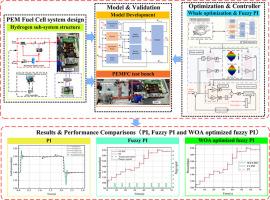鲸鱼算法优化了燃料电池系统在喷射器再循环模式下的阳极压力控制器
IF 9.6
Q1 COMPUTER SCIENCE, ARTIFICIAL INTELLIGENCE
引用次数: 0
摘要
质子交换膜燃料电池(pemfc)的阳极压力控制对供氢系统的稳定运行和燃料电池内部气体循环有着重要的影响。有效的阳极压力控制策略对于提高系统整体效率和减少寿命退化是必不可少的。有效的阳极压力控制可以防止在负载快速变化和吹扫干扰下的氢饥饿和输出性能不稳定。模糊控制在阳极压力控制研究中得到了广泛应用。然而,在现有的研究中,在控制参数整定过程中模糊规则的创建主要依赖于专家知识,导致对控制精度的担忧。本研究探讨了采用鲸鱼优化算法优化模糊参数选择的潜力。我们首先开发了一个面向控制的模型来解决氢供应系统中的非线性、耦合和不确定性。然后,在此基础上,考虑负载变化和吹扫干扰,将前馈补偿和模糊控制集成到传统的比例积分(PI)控制器中,以抑制输入干扰,提高控制精度,减小压力响应滞后。最后,提出了一种创新的模糊PI控制器,采用鲸鱼优化算法对模糊参数选择进行优化,从而实现精确的阳极压力控制。仿真测试表明,与传统PI控制相比,基于鲸鱼优化的模糊PI控制(WFLPIF)的均方根误差降低了14.3% (0.636 vs. 0.742),平均绝对百分比误差降低了28.8% (0.037 vs. 0.052),同时在RMSE和MAPE方面也优于前馈补偿模糊PI控制(FLPIF) 9.5%和17.8%。本研究证实了鲸鱼优化算法在解决燃料电池供氢系统阳极压力稳定性控制挑战方面的有效性。本文章由计算机程序翻译,如有差异,请以英文原文为准。

Whale algorithm optimized anode pressure controller for fuel cell systems in ejector recirculation mode
The anode pressure control in proton exchange membrane fuel cells (PEMFCs) significantly influences the stable operation of the hydrogen supply system and the internal gas circulation within the fuel cell. An efficient anode pressure control strategy is imperative for enhancing the overall system efficiency and mitigating lifespan degradation. Effective anode pressure control can prevent hydrogen starvation and instability in output performance under rapid load changes and purge disturbances. Fuzzy control has been extensively employed in anode pressure control studies. However, creating fuzzy rules in the control parameter’s tuning process in existing studies is predominantly dependent on expert knowledge, resulting in concerns about control accuracy. This study investigates the potential of employing the whale optimization algorithm to optimize the selection of fuzzy parameters. We first developed a control-oriented model to address the nonlinearity, coupling, and uncertainty in the hydrogen supply system. Then, based on the model and considering load variations and purge disturbances, we integrated feedforward compensation and fuzzy control into the conventional Proportional-Integral (PI) controller to suppress input disturbances, enhance control accuracy, and reduce the pressure response lag. Finally, an innovative fuzzy PI controller with the whale optimization algorithm is proposed to optimize the fuzzy parameter selection, thereby achieving precise anode pressure control. Simulation tests demonstrate that the whale-optimization-based fuzzy PI control (WFLPIF) reduces a root mean square error by 14.3 % (0.636 vs. 0.742) and a mean absolute percentage error by 28.8 % (0.037 vs. 0.052) compared to conventional PI control, while also outperforming feedforward-compensated fuzzy PI control (FLPIF) by 9.5 % in RMSE and 17.8 % in MAPE. This study substantiates the efficacy of the whale optimization algorithm in addressing the anode pressure stability control challenge of fuel cell hydrogen supply systems.
求助全文
通过发布文献求助,成功后即可免费获取论文全文。
去求助
来源期刊

Energy and AI
Engineering-Engineering (miscellaneous)
CiteScore
16.50
自引率
0.00%
发文量
64
审稿时长
56 days
 求助内容:
求助内容: 应助结果提醒方式:
应助结果提醒方式:


